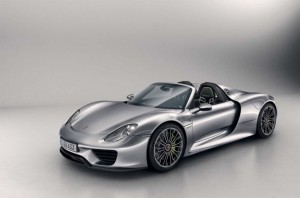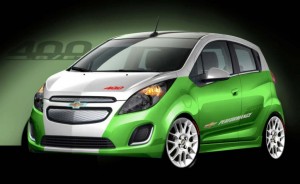The annual aftermarket extravaganza known as the SEMA Show has traditionally put a premium on performance, so that left many folks wondering why there was a little Chevrolet Spark EV on display at the Detroit maker’s stand alongside more traditional muscle cars like the Camaro and Chevrolet.
This wasn’t a regular Spark EV, it turned out, but a modified model that Chevy redubbed the Spark EV Tech Performance. And it has delivered a bit of a shock to those who think that battery cars are little more than high-tech stone ponies.
The numbers suggest something quite different, the Tech Performance package pumping out an impressive 450 pound-feet of torque. That’s 50 more than the stock Spark EV – but to put it into better perspective, that’s also more than the classic 1969 Chevrolet Camaro SS muscle car and 52 more lb-ft than a Ferrari 458 Italia.

Battery power can deliver surprising performance - as Porsche sets out to prove with the new 918 plug-in.
No, it won’t match the Italian job’s 0 to 60 times, but at 7.1 seconds off the line, the Spark EV Tech Performance package still manages a reasonably quick half-second better than the base Spark battery-car that recently went on sale in California.
(Click Here to check out the other concepts Chevy is showing at SEMA.)
Along with the trick green and white graphic package, the Tech gets a unique backlit Chevrolet “bowtie” on the grille, sporty billet aluminum wheels, distinctive body panels, sill plates, floor mats and pedal covers and other enhancements.
Particularly critical, the maker came up with what it describes as a “unique power-delivery algorithm that enhances acceleration.” Translation: the car’s software has been tweaked to let it deliver more current to its motors when the driver stomps the throttle.
(Ford has some “Hot Wheels” for SEMA. Click Here for a look.)
Surprisingly, Chevrolet claims the modifications won’t reduce the Tech package’s range compared to the production Spark EV – a moderate 82 miles per charge. Steps to trim weight off the show car may have helped boost range as well as performance. But expect that someone testing out the Tech’s tire-spinning capabilities more than occasionally would likely run short of battery a lot faster.
Chevrolet isn’t saying whether it might put a version of the Spark EV Tech Performance into production. The maker’s parent, General Motors, has promised to expand its line-up of electrified vehicles – including hybrids, plug-ins and pure battery-electric vehicles, however. And, as TheDetroitBureau.com recently reported, the Cadillac division is likely to get several for its line-up, starting with next year’s launch of the ELR plug-in hybrid.
(Click Here to find out more about Cadillac’s battery-car plans.)
Notably, the ELR will deliver better performance than the Chevrolet Volt with which it shares the same basic “Voltec” drivetrain.
In fact, there’s a subtle shift underway, a number of maker’s beginning to put more emphasis on performance with their latest electrified models. The new Honda Accord Hybrid is quicker than the comparable gas-only model, for example. And the 2014 Infiniti Q50 Hybrid is the sportiest version of that new luxury sedan line.
(Chrysler shakes things up at SEMA with the return of the Shaker Hood. Click Herefor the story.)
The good news for those who want both clean drivetrain technology and sporty driving behavior is that electrified propulsion can deliver both. Electric motors deliver maximum torque the moment they start spinning, unlike an internal combustion engine which must first rev up. The challenge is getting enough current to the motors which can, in turn, reduce mileage and range.
But some manufacturers are taking serious advantage of battery power’s performance potential. That includes Porsche which has launched a number of new hybrids and plug-ins, including the 918, an $845,000 supercar that can hit 60 in barely 2.8 seconds. Ferrari and McLaren are also relying on hybrid “superchargers” to deliver better performance – and mileage – from their latest LaFerrari and P1 models, respectively.
Tesla, meanwhile, brags that its Model S delivers Porsche 911 acceleration along with range of nearly 300 miles with the optional battery pack – at a price, however, that can push upwards of $100,000.


These toys are nice but impractical for 99% of society. In addition the extra power comes at a price in reduced range.